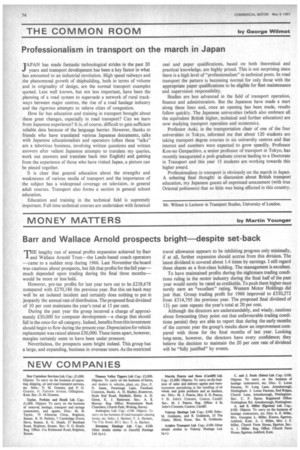Barr and Wallace Arnold prospects bright—despite set-back
Page 76

If you've noticed an error in this article please click here to report it so we can fix it.
E lengthy run of annual profits expansion achieved by Barr and Wallace Arnold Trust—the Leeds-based coach operators —came to a sudden stop during 1966. Last November the board was cautious about prospects, but felt that profits for the full year— much depended upon trading during the final three months— would be more or less held.
However, pre-tax profits for last year turn out to be £238,678 compared with £270,186 the previous year. But this set-back may well be an isolated incident and certainly does nothing to put in jeopardy the annual rate of distribution. The proposed final dividend of 10 per cent maintains the year's total at 15 per cent.
During the past year the group incurred a charge of approximately £30,000 for computer development—a charge that should fall in the once-for-all category. Indeed, benefits from this investment should begin to flow during the present year. Depreciation for vehicle replacement was raised almost £30,000. These items apart, however, margins certainly seem to have been under pressure.
Nevertheless, the prospects seem bright indeed. This group has a large, and expanding, business in overseas tours. As the restricted travel allowance appears to be inhibiting progress only minimally, if at all, further expansion should accrue from this division. The latest dividend is covered about 1.4 times by earnings. I still regard these shares as a first-class holding. The management is excellent.
To have maintained profits during the nightmare trading conditions ruling in the motor industry during the final half of the past year would surely be rated as creditable. To push them higher must surely earn an "excellent" rating. Western Motor Holdings did just that. Group trading profit for 1966 improved to £330,272 from £314,795 the previous year. The proposed final dividend of 124 per cent repeats the year's total at 20 per cent. Although the directors are understandably, and wisely, cautious about forecasting (they point out that unfavourable trading conditions persist) they are able to report that during the early months of the current year the group's results show an improvement compared with those for the final months of last year. Looking long-term, however, the directors have every confidence; they believe the decision to maintain the 20 per cent rate of dividend will be "fully justified" by events.




















































































































